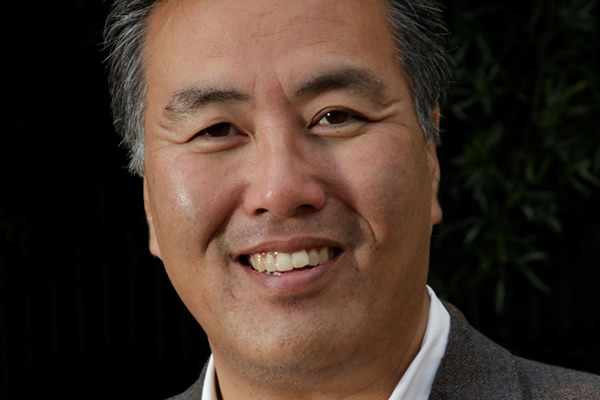News
Takano poised to win House seat from Calif.
Set to become first gay person of color in Congress

A California public school teacher is poised to win his election and become the first openly gay member of Congress who’s also a person of color.
Mark Takano, a Democrat, leads in the race to represent California’s newly created 41st congressional district in the U.S. House against Republican candidate, Riverside County Supervisor John Tavaglione.
With 54 percent of precincts reporting as of early Wednesday, Takano leads 57-43 percent; several media outlets have projected him the winner.
Chuck Wolfe, CEO of the Gay & Lesbian Victory Fund, said a Takano victory would be significant because in addition to becoming the first openly gay person of color to be elected to Congress as a Japanese-American, Takano would also be the first out person to represent California as a federal lawmaker.
“We’re excited that Mark Takano is heading to Capitol Hill, where he will be the first openly LGBT person of color to serve in Congress, and the first out Californian,” Wolfe said. “Mark joins a small but growing caucus of openly LGBT lawmakers in Washington who are challenging their colleagues to stand on the right side of history.”
A public school teacher for 23 years specializing in British literature, Takano is no stranger to public service. In 1990, he was elected to the Riverside Community College District’s Board of Trustees and has served on that body since then. In 2001, Takano helped shepherd through the board a measure enabling Riverside Community College employees to have domestic partner benefits.
He made earlier attempts at winning a House seat. In 1992, Takano lost by fewer than 550 votes against Rep. Ken Calvert (R-Calif.) in one of the closest congressional elections in California history. Takano made another unsuccessful attempt at running for the seat in 1994.
Politics
After Biden signs TikTok ban its CEO vows federal court battle
“Rest assured, we aren’t going anywhere,” CEO said

President Joe Biden signed an appropriations bill into law on Wednesday that provides multi-billion dollar funding and military aid for Ukraine, Israel, and Taiwan after months of delay and Congressional infighting.
A separate bill Biden signed within the aid package contained a bipartisan provision that will ban the popular social media app TikTok from the United States if its Chinese parent company ByteDance does not sell off the American subsidiary.
Reacting, TikTok CEO Shou Zi Chew said Wednesday that the Culver City, Calif.-based company would go to court to try to remain online in the United States.
In a video posted on the company’s social media accounts, Chew denounced the potential ban: “Make no mistake, this is a ban, a ban of TikTok and a ban on you and your voice,” Chew said. “Rest assured, we aren’t going anywhere. We are confident and we will keep fighting for your rights in the courts. The facts and the Constitution are on our side, and we expect to prevail,” he added.
Our response to the TikTok Ban Bill in the US: https://t.co/LpoE67sxHo
— TikTokComms (@TikTokComms) April 24, 2024
White House Press Secretary Karine Jean-Pierre adamantly denied during a press briefing on Wednesday that the bill constitutes a ban, reiterating the administration’s hope that TikTok will be purchased by a third-party buyer and referencing media reports about the many firms that are interested.
Chew has repeatedly testified in both the House and Senate regarding ByteDance’s ability to mine personal data of its 170 million plus American subscribers, maintaining that user data is secure and not shared with either ByteDance nor agencies of the Chinese government. The testimony failed to assuage lawmakers’ doubts.
In an email, the former chair of the House Intelligence Committee, California Democratic Congressman Adam Schiff, who doesn’t support a blanket ban of the app, told the Blade:
“As the former chairman of the House Intelligence Committee, I have long worked to safeguard Americans’ freedoms and security both at home and abroad. The Chinese Communist Party’s ability to exploit private user data and to manipulate public opinion through TikTok present serious national security concerns. For that reason, I believe that divestiture presents the best option to preserve access to the platform, while ameliorating these risks. I do not support a ban on TikTok while there are other less restrictive means available, and this legislation will give the administration the leverage and authority to require divestiture.”
A spokesperson for California U.S. Senator Alex Padilla told the Blade: “Senator Padilla believes we can support speech and creativity while also protecting data privacy and security. TikTok’s relationship to the Chinese Communist Party poses significant data privacy concerns. He will continue working with the Biden-Harris administration and his colleagues in Congress to safeguard Americans’ data privacy and foster continued innovation.”
The law, which gives ByteDance 270 days to divest TikTok’s U.S. assets, expires with a January 19, 2025 deadline for a sale. The date is one day before President Biden’s term is set to expire, although he could extend the deadline by three months if he determines ByteDance is making progress or the transaction faces uncertainty in a federal court.
Former President Donald Trump’s executive order in 2020, which sought to to ban TikTok and Chinese-owned WeChat, a unit of Beijing, China-based Tencent, in the U.S., was blocked by federal courts.
TikTok has previously fought efforts to ban its widely popular app by the State of Montana last year, in a case that saw a U.S. District Court judge in Helena block that state ban, citing free-speech grounds.
The South China Morning Post reported this week that the four-year battle over TikTok is a significant front in a war over the internet and technology between Washington and Beijing. Last week, Apple said China had ordered it to remove Meta Platforms’ WhatsApp and Threads from its App Store in China over Chinese national security concerns.
A spokesperson for the ACLU told the Blade in a statement that “banning or requiring divestiture of TikTok would set an alarming global precedent for excessive government control over social media platforms.”
LGBTQ+ TikToker users are alarmed, fearing that a ban will represent the disruption of networks of support and activism. However, queer social media influencers who operate on multiple platforms expressed some doubts as to long term impact.
Los Angeles Blade contributor Chris Stanley told the Blade:
“It might affect us slightly, because TikTok is so easy to go viral on. Which obviously means more brand deals, etc. However they also suppress and shadow ban LGBTQ+ creators frequently. But we will definitely be focusing our energy more on other platforms with this uncertainty going forward. Lucky for us, we aren’t one trick ponies and have multiple other platforms built.”
Brooklyn, New York-based Gay social media creator and influencer Artem Bezrukavenko told the Blade:
“For smart creators it won’t because they have multiple platforms. For people who put all their livelihood yes. Like people who do livestreams,” he said adding: “Personally I’m happy it gets banned or American company will own it so they will be less homophobic to us.”
TikTok’s LGBTQ+ following has generally positive experiences although there have been widely reported instances of users, notably transgender users, seemingly targeted by the platform’s algorithms and having their accounts banned or repeatedly suspended.
Of greater concern is the staggering rise in anti-LGBTQ+ violence and threats on the platform prompting LGBTQ+ advocacy group GLAAD, in its annual Social Media Safety Index, to give TikTok a failing score on LGBTQ+ safety.
Additional reporting by Christopher Kane
Pennsylvania
Malcolm Kenyatta could become the first LGBTQ statewide elected official in Pa.
State lawmaker a prominent Biden-Harris 2024 reelection campaign surrogate

Following his win in the Democratic primary contest on Wednesday, Pennsylvania state Rep. Malcolm Kenyatta, who is running for auditor general, is positioned to potentially become the first openly LGBTQ elected official serving the commonwealth.
In a statement celebrating his victory, LGBTQ+ Victory Fund President Annise Parker said, “Pennsylvanians trust Malcolm Kenyatta to be their watchdog as auditor general because that’s exactly what he’s been as a legislator.”
“LGBTQ+ Victory Fund is all in for Malcolm, because we know he has the experience to win this race and carry on his fight for students, seniors and workers as Pennsylvania’s auditor general,” she said.
Parker added, “LGBTQ+ Americans are severely underrepresented in public office and the numbers are even worse for Black LGBTQ+ representation. I look forward to doing everything I can to mobilize LGBTQ+ Pennsylvanians and our allies to get out and vote for Malcolm this November so we can make history.”
In April 2023, Kenyatta was appointed by the White House to serve as director of the Presidential Advisory Commission on Advancing Educational Equity, Excellence and Economic Opportunity for Black Americans.
He has been an active surrogate in the Biden-Harris 2024 reelection campaign.
District of Columbia
Bowser budget proposal calls for $5.25 million for 2025 World Pride
AIDS office among agencies facing cuts due to revenue shortfall

D.C. Mayor Muriel Bowser’s proposed fiscal year 2025 budget includes a request for $5.25 million in funding to support the June 2025 World Pride celebration, which D.C. will host, and which is expected to bring three million or more visitors to the city.
The mayor’s proposed budget, which she presented to the D.C. Council for approval earlier this month, also calls for a 7.6 percent increase in funding for the Mayor’s Office of LGBTQ Affairs, which amounts to an increase of $132,000 and would bring the office’s total funding to $1.7 million. The office, among other things, provides grants to local organizations that provide services to the LGBTQ community.
Among the other LGBTQ-related funding requests in the mayor’s proposed budget is a call to continue the annual funding of $600,000 to provide workforce development services for transgender and gender non-conforming city residents “experiencing homelessness and housing instability.” The budget proposal also calls for a separate allocation of $600,000 in new funding to support a new Advanced Technical Center at the Whitman-Walker Health’s Max Robinson Center in Ward 8.
Among the city agencies facing funding cuts under the mayor’s proposed budget is the HIV/AIDS, Hepatitis, Sexually Transmitted Disease, and Tuberculosis Administration, known as HAHSTA, which is an arm of the D.C. Department of Health. LGBTQ and AIDS activists have said HAHSTA plays an important role in the city’s HIV prevention and support services. Observers familiar with the agency have said it recently lost federal funding, which the city would have to decide whether to replace.
“We weren’t able to cover the loss of federal funds for HAHSTA with local funds,” Japer Bowles, director of the Mayor’s Office of LGBTQ Affairs, told the Washington Blade. “But we are working with partners to identify resources to fill those funding gaps,” Bowles said.
The total proposed budget of $21 billion that Bowser submitted to the D.C. Council includes about $500 million in proposed cuts in various city programs that the mayor said was needed to offset a projected $700 million loss in revenue due, among other things, to an end in pandemic era federal funding and commercial office vacancies also brought about by the post pandemic commercial property and office changes.
Bowser’s budget proposal also includes some tax increases limited to sales and business-related taxes, including an additional fee on hotel bookings to offset the expected revenue losses. The mayor said she chose not to propose an increase in income tax or property taxes.
Earlier this year, the D.C. LGBTQ+ Budget Coalition, which consists of several local LGBTQ advocacy organizations, submitted its own fiscal year 2025 budget proposal to both Bowser and the D.C. Council. In a 14-page letter the coalition outlined in detail a wide range of funding proposals, including housing support for LGBTQ youth and LGBTQ seniors; support for LGBTQ youth homeless services; workforce and employment services for transgender and gender non-conforming residents; and harm reduction centers to address the rise in drug overdose deaths.
Another one of the coalition’s proposals is $1.5 million in city funding for the completion of the D.C. Center for the LGBTQ Community’s new building, a former warehouse building in the city’s Shaw neighborhood that is undergoing a build out and renovation to accommodate the LGBTQ Center’s plans to move in later this year. The coalition’s budget proposal also calls for an additional $300,000 in “recurring” city funding for the LGBTQ Center in subsequent years “to support ongoing operational costs and programmatic initiatives.”
Bowles noted that Bowser authorized and approved a $1 million grant for the LGBTQ Center’s new building last year but was unable to provide additional funding requested by the budget coalition for the LGBTQ Center for fiscal year 2025.
“We’re still in this with them,” Bowles said. “We’re still looking and working with them to identify funding.”
The total amount of funding that the LGBTQ+ Budget Coalition listed in its letter to the mayor and Council associated with its requests for specific LGBTQ programs comes to $43.1 million.
Heidi Ellis, who serves as coordinator of the coalition, said the coalition succeeded in getting some of its proposals included in the mayor’s budget but couldn’t immediately provide specific amounts.
“There are a couple of areas I would argue we had wins,” Ellis told the Blade. “We were able to maintain funding across different housing services, specifically around youth services that affect folks like SMYAL and Wanda Alston.” She was referring to the LGBTQ youth services group SMYAL and the LGBTQ organization Wanda Alston Foundation, which provides housing for homeless LGBTQ youth.
“We were also able to secure funding for the transgender, gender non-conforming workforce program,” she said. “We also had funding for migrant services that we’ve been advocating for and some wins on language access,” said Ellis, referring to programs assisting LGBTQ people and others who are immigrants and aren’t fluent in speaking English.
Ellis said that although the coalition’s letter sent to the mayor and Council had funding proposals that totaled $43.1 million, she said the coalition used those numbers as examples for programs and policies that it believes would be highly beneficial to those in the LGBTQ community in need.
“I would say to distill it down to just we ask for $43 million or whatever, that’s not an accurate picture of what we’re asking for,” she said. “We’re asking for major investments around a few areas – housing, healthcare, language access. And for capital investments to make sure the D.C. Center can open,” she said. “It’s not like a narrative about the dollar amounts. It’s more like where we’re trying to go.”
The Blade couldn’t’ immediately determine how much of the coalition’s funding proposals are included in the Bowser budget. The mayor’s press secretary, Daniel Gleick, told the Blade in an email that those funding levels may not have been determined by city agencies.
“As for specific funding levels for programs that may impact the LGBTQ community, such as individual health programs through the Department of Health, it is too soon in the budget process to determine potential adjustments on individual programs run though city agencies,” Gleick said.
But Bowles said several of the programs funded in the mayor’s budget proposal that are not LGBTQ specific will be supportive of LGBTQ programs. Among them, he said, is the budget’s proposal for an increase of $350,000 in funding for senior villages operated by local nonprofit organizations that help support seniors. Asked if that type of program could help LGBTQ seniors, Bowles said, “Absolutely – that’s definitely a vehicle for LGBTQ senior services.”
He said among the programs the increased funding for the mayor’s LGBTQ Affairs office will support is its ongoing cultural competency training for D.C. government employees. He said he and other office staff members conduct the trainings about LGBTQ-related issues at city departments and agencies.
Bowser herself suggested during an April 19 press conference that local businesses, including LGBTQ businesses and organizations, could benefit from a newly launched city “Pop-Up Permit Program” that greatly shortens the time it takes to open a business in vacant storefront buildings in the downtown area.
Bowser and Nina Albert, D.C. Deputy Mayor for Planning and Economic Development, suggested the new expedited city program for approving permits to open shops and small businesses in vacant storefront spaces could come into play next year when D.C. hosts World Pride, one of the word’s largest LGBTQ events.
“While we know that all special events are important, there is an especially big one coming to Washington, D.C. next year,” Bowser said at the press conference. “And to that point, we proposed a $5.25 million investment to support World Pride 2025,” she said, adding, “It’s going to be pretty great. And so, we’re already thinking about how we can include D.C. entrepreneurs, how we’re going to include artists, how we’re going to celebrate across all eight wards of our city as well,” she said.
Among those attending the press conference were officials of D.C.’s Capital Pride Alliance, which will play a lead role in organizing World Pride 2025 events.




















